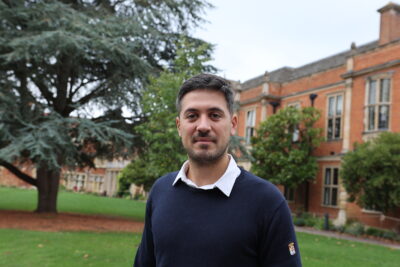We are delighted to share the achievements of Dr Raffaele Sarnataro, one of our Fulford Junior Research Fellows, whose recent publication in Nature unveils the mitochondrial origins of the need to sleep.
Dr Sarnataro, who is also a Postdoctoral Fellow at the University of Oxford, is the first author on a paper published in Nature this summer, titled ‘Mitochondrial origins of the pressure to sleep’. The study, which can be accessed here, addresses one of biology’s central mysteries: why we need sleep.

Dr Raffaele Sarnataro at Somerville
By studying a small group of sleep-regulating neurons in fruit flies, Raffaele and colleagues in the Miesenböck group at the Department of Physiology, Anatomy, and Genetics discovered that mitochondria—the tiny “powerhouses” of our cells that use the oxygen we breathe to convert food into energy —play a central role in generating sleep pressure.
During wakefulness, these neurons use little energy, but their mitochondria continue to run, leading to an “overflow” of electrons that creates metabolic stress. This stress builds up until it triggers the need to sleep, acting like a built-in cellular circuit breaker to protect the brain. The work suggests that sleep is not only rest for the mind but also essential maintenance for the cells’ power supply, with wide-ranging implications for ageing and neurological disease.
For example, these results might help explain the well-established associations among metabolism, sleep, and lifespan. Smaller animals, which exhibit higher oxygen consumption per unit body mass, generally require more sleep and have shorter lifespans. Likewise, individuals with mitochondrial disorders often experience severe fatigue even in the absence of physical exertion—a phenomenon that might arise from similar underlying mechanisms.
The paper has received wide international attention, with coverage in Science, The Economist, Nature Podcast, Vice, The Scientist, The Transmitter, NewScientist, University of Oxford news highlights, Department of Physiology, Anatomy and Genetics, ScienzaInRete, and more.
On the back of this discovery, Raffaele was invited by The Journal of Physiology to author a review article, ‘Neurobiology of mitochondrial dynamics in sleep’ (2025), which places the findings in a wider biological context across species and brain regions.
These publications highlight the pioneering contributions of Somerville JRFs at the frontiers of life science.
For more information on Dr Sarnataro’s research, visit his profile here.